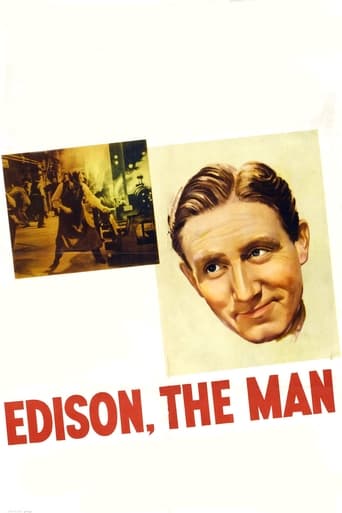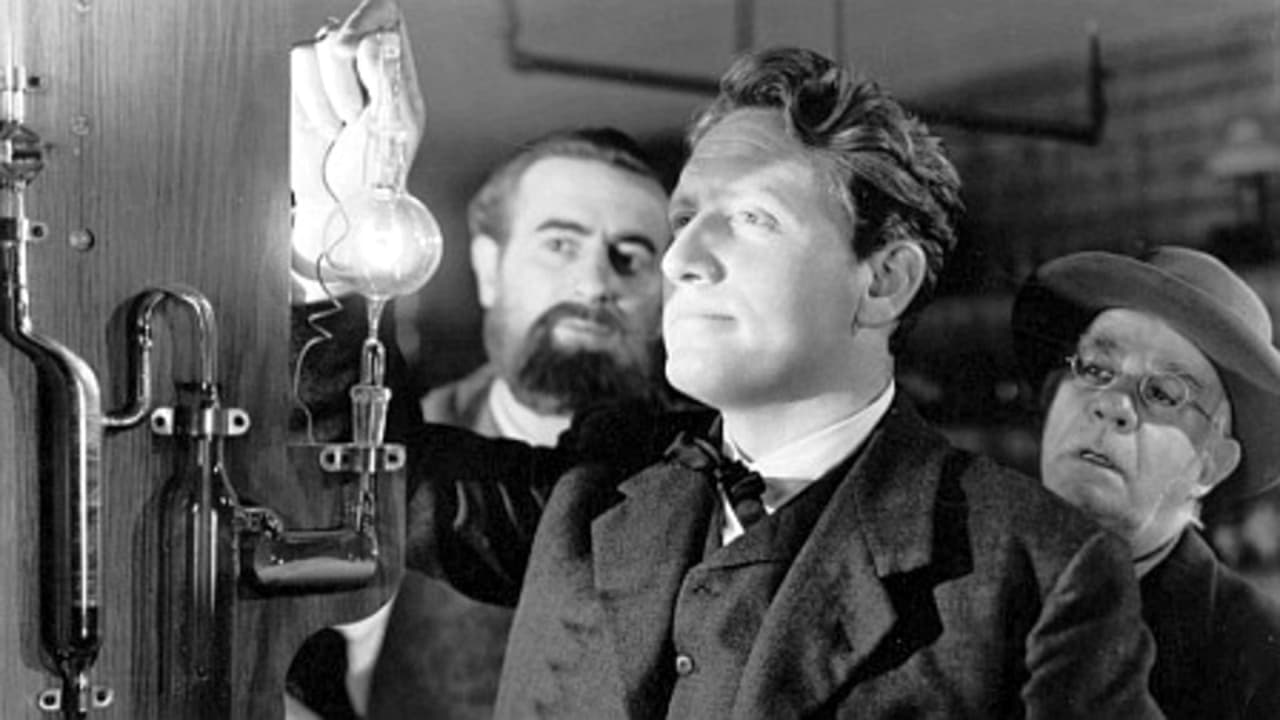lugonian
EDISON, THE MAN (Metro-Goldwyn-Mayer, 1940), directed by Clarence Brown, became Hollywood's second contribution into the life of one of America's greatest inventors, Thomas Alva Edison (1847-1931). Following the earlier release of YOUNG TOM EDISON (1940) starring Mickey Rooney, which covered the title character's boyhood years in Port Huron, Michigan, this second of a two-part biography covers the rest of the story of Edison's life from unknown inventor to historic figure. Rather than waiting a few years having Rooney coming of age to reprise his Edison role, this continuing story not only came a few months after its initial release, but one of the few sequels where none of the actors nor director (Norman Taurog) from the preceding film returns. The acting honor goes to Spencer Tracy in one of his more challenging film roles of his career. While it's logical for anyone who's seen both these films to make comparisons, it's easy to point out how EDISON, THE MAN is connected with the other through its underscoring of "Sweet Genevieve" in certain scenes; a reminder of Edison's slight trouble with his hearing; Edison's communication through the use of Morse Code by tapping on the pipes; and eating his favorite meal, apple pie and milk. Rather than starting off with the usual "Forward" reading to what's to be presented, it offers a written passage by Ralph Waldo Emerson that states: "The true test of civilization is not the census, nor the size of cities, not the crops - no, but the kind of man the country turns out." And now, on with the adult life of Thomas Edison. Getting down to basics from an original story by Dore Schary and Hugo Butler, the adult life of a great man begins with a golden jubilee of light (1879-1929) where 82-year-old Thomas Alva Edison (Spencer Tracy) is being interviewed by a couple of teenagers (Jay Ward and Anne Gillis) getting the facts for their school newspaper before attending the banquet in his honor at Independence Hall. As Edison sits at the table as the speaker tells about his life, he thinks back to the days of 1869 as a young man coming to New York City from Boston on an invitation from his friend and telegrapher, Bunt Cavatt (Lynne Overman) to come work for Ben Els (Henry Travers). Attempting to get James J. Taggart (Gene Lockhart) of Wall Street to finance him for his inventions, Edison gets support from General Powell (Charles Coburn), president of Western Union. After selling his invention, Edison, who earlier met Mary Stillwell (Rita Johnson), earns enough money to get married and open his own invention factory in Menlo Park, New Jersey (The reproduction of it is first rate set designing). Edison's marriage brings forth two children, but due to he working tirelessly on his many inventions, it nearly causes hardship on his marriage. After Powell dies, it appears Edison will face financial ruin, but with the confidence and loyalty of those working under him, he strives to work on the greatest invention of all time.Aside from Felix Bressart, Peter Godfrey, Milton Parsons, Byron Foulger, Grant Mitchell and Addison Richards leading fine support, Gene Reynolds, in small but worthy performance as Jimmy Price, a teenage runaway landing a job with Edison's middle-aged associates on various inventions. While one serious mistake nearly puts him on the downside, Tracy's Edison give him this great line as he gives him that's second chance, "One thing about mistakes, they don't have to be permanent." Rita Johnson's role as Mrs. Edison is a bit downplayed at times and offers little challenge to her performance.As cliché as movie biographies goes, EDISON, THE MAN ranks one of the best of its kind. Naturally historians might be discouraged with some inaccuracies or eliminations that took part in Edison's life, yet so much can only be disclosed without putting this motion picture past the two or three hour mark. The fact that Edison's second wife and more children are eliminated, the screenplay covers more on his struggles than personal life and achievements, namely that on the invention of the phonograph, dictating machine (Edison's first words, "Mary had a little lamb ...") and finally doing the impossible by lighting up New York City, the most detailed of all.One cannot help but notice similarities of Edison with Tracy's earlier portrayal of Father Flanagan taken from BOYS TOWN (1938) as one who doesn't let troubles discourage him. As Edison is said to be as one who would have been a great man even if he never invented anything, Tracy would have been a great actor even if he never won an Academy Award. Though Tracy did win two, he earned no nomination for this fine portrayal. Longer and a bit slower than YOUNG TOM EDISON, EDISON, THE MAN is unforgettable by any means, especially Tracy's exact likeness towards the real Edison, the old man.Regardless of minor flaws and/or factual errors (that's to be expected), EDISON, THE MAN is no disappointment. To learn more about Edison's life as depicted on screen, get hold of the old home video release from 1991, DVD copy, or wait for another broadcast on Turner Classic Movies. To learn more on Edison in the life as he lived it, check out a library book from the biography section. (****)
vincentlynch-moonoi
I had to chuckle when I read a couple of the other reviews here for the mentioning of Nikola Tesla. I remember as a teenager, my best friend idolized Tesla and was so negative about Edison. And, although MGM hired advisers from The Edison Institute and Thomas A. Edison, Inc. (of course, they may have had a perspective about Edison that was just a bit prejudiced in his favor), this movie does give unrealistic homage to Edison. But, that was exactly the intent of the film. To portray an American hero whose many inventions and business efforts helped transform America. It's as accurate as the typical movie bio-pic of the era, but those of us who live today cannot quite imagine how Edison and his inventions captured the American spirit.The first amazing thing about this film is in the opening and closing scenes where Tracy (with makeup) resembles the elderly Edison to an extent that is amazing.Tracy had a remarkable range, and this picture reminds me of his performance in the two Boys Town movies, while during the same time period he played quite different roles in "Northwest Passage" and "Boom Town". I can't think of an actor of that era (or this) who was more perfect for the role of Edison.Rita Johnson is good here as Edison's wife. A tragedy led to the virtual end of her career. Charles Coburn has an all too short role as an investor, and Gene Lockhart is very good as one of Edison's competitors. A number of fine character actors portray Edison's assistants, including Felix Bressart and Henry Travers.The plot of the story simply follows some of Edison's inventions, with the most attention being given to his light bulb. The story is particularly inaccurate in terms of his family life -- he was married twice (only once in the movie) and had quite a few more children than the movie depicted. But the topic of the movie is Edison, the hero. And in that it accomplishes its goals.Highly recommended, and it's certainly found a place on my DVD shelf.
dwpollar
1st watched 9/11/2009 - 7 out of 10 (Dir- Clarence Brown): Wonderful chronicle of a maverick man and his inventions played by the always likable Spencer Tracy. The movie starts with the elderly Edison(with a nice set of makeup) being honored for his invention of the lightbulb, and then the story goes back to his early days before his first major invention. He was already twiddling with telegraph machines at this point, so we don't really get to see where his motivation came from -- just that he liked to do this. He is personally very ambitious from the beginning and knows that he has to have funds to do what he wants, so he stalks one of the richest men in town for his attention. He gets it after fixing one of his machines and he is hired and is given the space and time to create. He and his ragtag group start putting together quite a few accomplishments to the point where they have their own building and steady workforce. He's shown as having a good comraderie with his close knit fellows but has to let them go when things get rough. At least until the lightbulb is created, then things explode. I'm sure this story isn't 100% true when it comes to Edison as a person, but they do make good entertainment with it. Tracy also gives a good performance and is given a couple of nice speeches(that obviously come from the real Edison). Overall, this is light family entertainment, good for everyone, with an educational message. This doesn't happen often in the movies and MGM did well with this one as the usually did in this era.
theowinthrop
Spencer Tracy rarely played real people. He played a character based on Arnold Rothstein in an early film for Fox, and Henry Morton Stanley in STANLEY AND LIVINGSTON, and Rogers of Rogers' Rangers in NORTHWEST PASSAGE, and Clarence Darrow (Henry Drummond) in INHERIT THE WIND, and the Captain of the Mayflower in PLYMOUTH ADVENTURE. It seems like a large number of films, but it is really less than three percent of his movies. He also appeared in this film as the great inventor (over 1,000 patents) Thomas Alva Edison (1847 - 1931). In 1940 Edison was a national hero. Nobody was quite like him, although Alexander Graham Bell (soon to be subject of a film starring Don Ameche) was a figure of great interest too. So was Samuel Morse, inventor of the telegraph, and Eli Whitney, inventor of the Cotton Gin. However no films were made about them. There was a film with Fred MacMurray and Alice Faye about Robert Fulton and his steamboat, but none about the Wright brothers.Because of the period of history it was made in, film biography rarely was totally dispassionate. All Americans heroes were flawless, so all questions about Edison's stealing credit from assistants or other inventors was pushed aside (his involvement in the patent battles about the telephone is not mentioned). Nor were his flop inventions: pre-fabricated houses made of cement (actually a good idea, but ahead of it's time), the attempt to be the biggest gold ore refiner in the East (using huge machines to grind the ore out of rocks), the electric car motor. His bigoted feelings towards foreigners (Jews, rival inventors like Nicola Tesla) were not mentioned, nor was his rejection of the offer of a joint 1911 Nobel Prize for Physics (for the accidental discovery of the Edison Affect of carbonization in electricity) because he had to have it with Tesla for discovering alternating current. None of this is mentioned...only the string of great inventions he had a major hand in from 1868 to 1894. As a surface study of his career it is passable, and Tracy and the cast (in particular Gene Lockhart as his critic and nemesis Taggart) are splendid. You'll be entertained, but read A STREAK OF LUCK by Robert Conot for the true story.



 AD
AD



